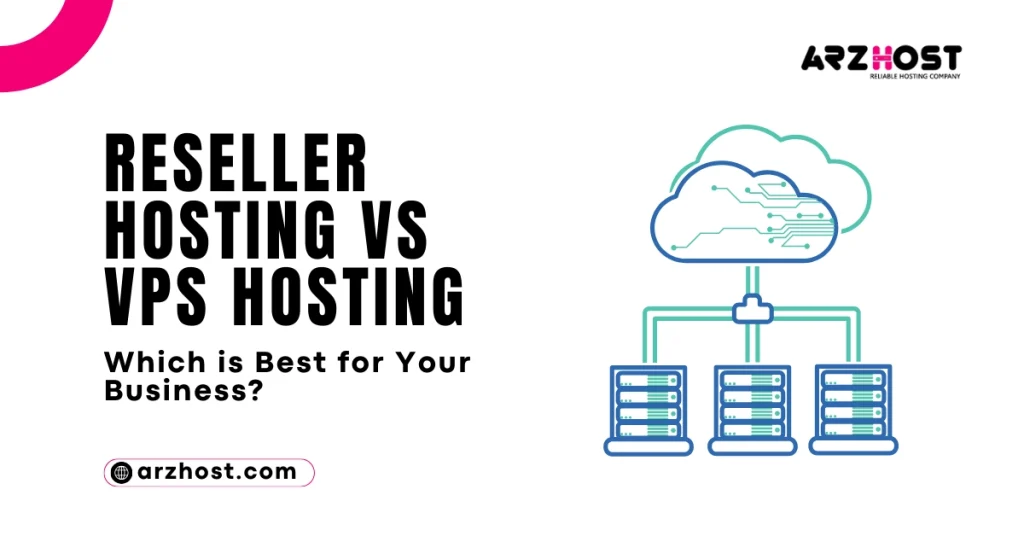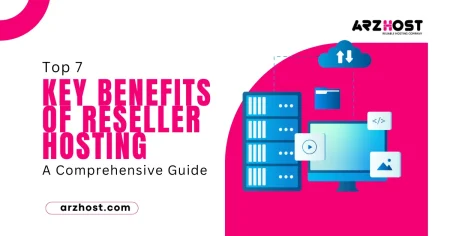In modern business circles, a website is among the most important assets that a company or organization can possess. The era of little businesses is over, and now is the moment for every company to become globally recognized. This level of innovation creates new demands for web hosting for clients.
The two most popular ways to satisfy those hosting needs—reseller hosting vs vps hosting—will be covered in this article.
To assist you in selecting the ideal web hosting plan for your group, we’ll evaluate reseller hosting vs VPS hosting and go over the benefits and drawbacks of each hosting alternative.
Comparison of Reseller Web Hosting vs VPS Web Hosting:
| Feature | Reseller Web Hosting | VPS Web Hosting |
| Type of service | Resell web hosting space to others | Dedicated virtual server resources |
| Control over resources | Limited | Full control |
| Scalability | Limited by purchased resources | Easily scalable by upgrading plan |
| Performance | Shared resources, can be slower | Dedicated resources, faster performance |
| Security | Shared server environment, less secure | Isolated environment, more secure |
| Technical knowledge required | Basic knowledge sufficient | Advanced technical knowledge recommended |
| Cost | More affordable per customer | Higher cost per server |
| Suitable for | Beginners, small businesses, low-traffic websites | Busy websites, demanding applications, eCommerce |
| Popular plans | Economy plan ($12.99/mo), Super Plan ($23.99/mo), Deluxe Plan ($36.99/mo) | Starter ($12.50/mo), Value VPS ($16.00/mo), Essential VPS ($34.00/mo), Elite VPS ($60.00/mo) |
What is VPS Web Hosting?
Imagine a bustling apartment building. Shared web hosting is like everyone living in the same big room, sharing resources like water and electricity. While affordable, it can get crowded and noisy, impacting everyone’s comfort. Now, picture individual apartments within that building – that’s VPS web hosting!
VPS, or Virtual Private Server, hosting takes a physical server and, using virtualization technology, slices it into smaller, virtual servers. Each VPS acts like its own dedicated server, with its own operating system, resources (CPU, RAM, storage, bandwidth), and security.

You’re basically renting an apartment within the building, with control over your space and guaranteed resources, free from neighborly disruptions.
Virtual Private Server is what VPS stands for. A virtual private server (VPS) divides resources on a bigger server (referred to as the parent server) into smaller server instances using specialized virtualization technology.
Every one of these divisions is regarded as a complete server, able to run several websites on different user accounts and an operating system that is self-contained.
The distribution of resources among users is a primary difference between a virtual private server (VPS) and a conventional shared server. Since resources aren’t shared with other users, those allotted for the instance are yours and kept private.
Here’s why VPS stands out:
- Performance Boost: Compared to shared hosting, VPS offers significantly faster loading times and better reliability. Your website won’t be slowed down by other users on the server.
- Increased Control: You have root access, allowing you to customize your VPS environment, install software, and configure settings to your specific needs. Think of it as decorating your own apartment!
- Scalability: Need more resources as your website grows? No problem! Upgrading your VPS plan is easy, unlike expanding your shared room.
- Enhanced Security: Each VPS is isolated, making it less vulnerable to security threats originating from other websites on the server. Your apartment has its own lock and key, giving you peace of mind.
VPS hosting is ideal for growing businesses, resource-intensive websites, e-commerce platforms, and anyone who needs more control and performance than shared hosting provides. It’s the perfect bridge between shared hosting and the high cost of a dedicated server.
Another possibility for web hosting is a managed VPS server. But it’s not the same as the conventional VPS model that was previously covered. You can choose between Plesk, Inter Worx, or cPanel as the control panel when purchasing this kind of virtual private server.
All daily server operations, such as the following, are managed by a third-party hosting provider:
- Application.
- Installation.
- maintenance.
- leadership.
- Fixing issues.
- Observation and Reporting.
To save time, businesses could decide to use a managed VPS option. Now, they can focus on more important and mission-critical responsibilities like customer support and business development instead of spending hours monitoring their servers.
So, if you’re looking for a secure, reliable, and flexible web hosting solution for your website, VPS might be the virtual apartment you’ve been searching for!
Advantages of VPS Web Hosting
VPS web hosting, or Virtual Private Server hosting, offers a sweet spot between the affordability of shared hosting and the full control of dedicated servers. Here are some of its key advantages:
- Improved Performance: Unlike shared hosting, where your website shares resources with others, VPS provides dedicated resources like CPU, RAM, and storage. This translates to faster loading times, better responsiveness, and a smoother user experience for your website visitors.
- Enhanced Security: With your own virtualized server, you’re isolated from other users, minimizing the risk of security breaches or resource hogging by neighbors. This is especially crucial for e-commerce sites or those handling sensitive data.
- Scalability: One of the biggest strengths of VPS is its flexibility. You can easily scale your resources up or down as your website’s needs evolve. This eliminates the need to upgrade to a completely new server if your traffic spikes occasionally.
- Root Access and Control: Depending on your VPS plan, you may have root access, giving you greater control over your server settings and software installation. This allows you to tailor the environment to your specific requirements and optimize performance.
- Cost-Effectiveness: Compared to dedicated servers, VPS offers a more budget-friendly option with dedicated resources. You only pay for the resources you use, making it a cost-effective solution for growing websites.
- Improved Reliability: VPS hosting generally suffers less downtime than shared hosting as resource issues from other users are less likely to impact your website. This ensures greater stability and uptime for your online presence.
ARZ Host offer managed VPS plans where they handle server maintenance and technical support, allowing you to focus on your website.
You can often choose the operating system for your VPS, such as Linux or Windows, depending on your needs.
VPS usually offers convenient backup and restore options for your website data, ensuring business continuity.
Overall, VPS web hosting is a powerful and versatile option for websites that have outgrown shared hosting but don’t yet require the full capacity of a dedicated server.
It offers a great balance of performance, security, flexibility, and cost-effectiveness, making it a popular choice for small and medium-sized businesses.
Remember, the best hosting solution depends on your specific needs and budget. Consider factors like website traffic, resource requirements, technical expertise, and future growth potential when choosing a VPS plan.
Disadvantages of VPS Web Hosting
VPS has limitations even if it’s the superior hosting choice. The following are a few of the most typical disadvantages of utilizing the VPS model:
- Higher Cost Compared to Shared Hosting: While still cheaper than dedicated servers, VPS hosting incurs higher costs than shared hosting due to its dedicated resource allocation. This can be a disadvantage for small websites with low traffic and limited budgets. However, the performance and security benefits often outweigh the cost difference as your website grows.
- Technical Knowledge Requirement: Self-managed VPS plans require users to have some technical expertise for server management tasks like software installation, security updates, and troubleshooting. This can be daunting for beginners who prefer a hands-off approach. Managed VPS plans provide support, but come at an additional cost.
- Limited Resources: While dedicated compared to shared hosting, VPS resources are still finite. Sudden traffic spikes or resource-intensive applications can overwhelm a low-tier VPS plan, leading to performance issues. Scaling resources on a VPS can be quicker than shared hosting, but still involves upgrading your plan and potential downtime.
Remember, the disadvantages of VPS hosting should be weighed against its numerous advantages like improved performance, security, and scalability. Ultimately, the decision depends on your website’s needs, budget, and technical expertise.
What is Reseller Web Hosting?
A large server owner that resells some of their bandwidth and disk space to other customers is using reseller hosting, which is another type of web hosting. These customers have a place to host their website thanks to this rented space.
A control panel similar to the ones (cPanel, Plesk, or Inter Worx) previously described is typically included with reseller hosting. You may easily and securely manage the features and services of a website by gaining access to this control panel.

For reseller hosting, a variety of servers or services are used. These comprise Cloud Sites servers, private VPS parent servers, VPS servers, and dedicated servers.
Reseller web hosting is another option that ARZ Host provides. With the support of VMware and NetApp, it gives clients access to a redundant server pool and gives them the flexibility to spin up or down virtual machines (VMs) following the available hardware.
Every one of these options is different and will rely on your needs. Depending on their size, particular use cases, or intended server usage, clients can choose the optimal alternative for their business.
ARZ Host Reseller Web Hosting gives you the tools and resources to launch your own web hosting business. It’s a cost-effective and scalable solution for entrepreneurs seeking additional income streams in the web hosting industry.
Advantages of Reseller Web Hosting
ARZ Host Reseller Web Hosting comes with a variety of advantages that make it a great choice for businesses of all sizes. Here are some of the key benefits:
- Affordability: ARZ Host offers some of the most competitive reseller hosting prices in the market. Their plans start at just $12.50 per month, and they offer a variety of discounts and promotions. This makes it easy to get started with reseller hosting without breaking the bank.
- Scalability: ARZ Host’s reseller hosting plans are very scalable. You can start with a small plan and then upgrade as your business grows. This gives you the flexibility to meet the needs of your clients without having to worry about outgrowing your hosting plan.
- White-labeled: ARZ Host’s reseller hosting plans are white-labeled, which means that you can brand them as your own. This allows you to create a unique offering for your clients and build your own brand.
- Features: ARZ Host’s reseller hosting plans come with a variety of features, including unlimited cPanel accounts, unlimited bandwidth, unlimited disk space, and free SSL certificates. This gives you everything you need to host your clients’ websites successfully.
- Reliability: ARZ Host has a strong reputation for reliability. They offer a 99.9% uptime guarantee and 24/7 customer support. This gives you peace of mind knowing that your clients’ websites will be up and running when they need them.
- Support: ARZ Host offers excellent customer support. Their team is available 24/7 to help you with any questions or problems you may have. This is important, as you will need to be able to support your clients when they have hosting issues.
Overall, ARZ Host Reseller Web Hosting is a great option for businesses of all sizes looking for a reliable, affordable, and scalable hosting solution.
With its wide range of features and excellent customer support, ARZ Host can help you take your web hosting business to the next level.
Disadvantages of Reseller Web Hosting
While ARZ Host has gained popularity for its reseller web hosting, it’s critical to consider all aspects before making a decision. Here are 2 potential downsides to be aware of:
- Limited Server Resources: Unlike dedicated or VPS hosting, reseller plans share server resources with other customers. This can lead to performance issues during peak traffic times, especially on lower-tier plans with limited allocations. If your clients’ websites expect significant traffic, you might encounter slow loading times or even downtime.
- Brand Recognition and Marketing: Choosing a smaller hosting provider like ARZ Host might put you at a disadvantage compared to established web hosting brands. Building trust and attracting clients could require additional marketing efforts to overcome the lack of a well-known name. Additionally, some potential clients might prioritize established brands for perceived reliability and support.
Remember, these are potential downsides, and the actual impact might depend on your specific needs and ARZ Host’s individual plan features. It’s vital to evaluate your requirements, research thoroughly, and compare with other reseller hosting providers before making a decision.
Consider factors like server resource allocation, support options, brand reputation, pricing, and available features to find the best fit for your reseller hosting needs.
Choosing between reseller hosting vs VPS Hosting can be a head-scratcher, especially for web enthusiasts just starting out. Both offer impressive advantages, but understanding their core differences is crucial for aligning your choice with your specific needs. So, buckle up as we unravel the VPS vs. Reseller Hosting conundrum!
VPS, or Virtual Private Server, slices a physical server into virtual compartments, each acting as an independent server with dedicated resources like CPU, RAM, and storage.
Think of it as renting your own tiny apartment within a bigger building – you have privacy, control, and guaranteed resources, free from noisy neighbors (other websites).
This translates to better performance, stability, and security compared to shared hosting, while still being more affordable than a dedicated server.
Reseller hosting, on the other hand, is like subletting part of your apartment to others. You buy hosting resources in bulk from a provider, then repackage and resell them to your own clients.
You act as the middleman, creating custom hosting plans, setting prices, and providing support. This model is perfect for budding entrepreneurs wanting to build their own web hosting business without the hefty upfront costs of server infrastructure.
Our Verdict
Choosing between VPS Hosting vs Reseller Hosting hinges on your goals:
- For high-performance websites, resource-intensive applications, and scalability, VPS reigns supreme.
- For entrepreneurs, web designers, or agencies looking to resell hosting and manage multiple client accounts, Reseller Hosting is the clear winner.
Remember, VPS offers greater control and scalability but requires technical expertise. Reseller Hosting simplifies management and offers business opportunities but restricts customization. Evaluate your needs, technical skills, and business goals to make the right choice of web hosting for business.
Ultimately, both ARZ Host VPS Hosting and Reseller Hosting offer robust features and reliable performance. Consider your specific use case and choose the option that empowers you to achieve your online objectives.
FAQS (Frequently Asked Questions)
What’s the main difference between VPS and Reseller Hosting?
VPS (Virtual Private Server): You get your own dedicated resources (CPU, RAM, storage) within a shared physical server. It’s like having your own apartment in a building, offering more control and security than shared hosting, but less than a dedicated server.
Reseller Hosting: You buy hosting resources in bulk and resell them to your own customers at your own pricing. It’s like renting out multiple apartments in a building, perfect for web developers, agencies, or anyone wanting to start their own web hosting business.
Which is better for my needs?
VPS: Choose VPS if you need more power and control than shared hosting for resource-intensive websites or applications. It’s also good for those wanting to learn server management.
Reseller Hosting: Choose Reseller Hosting if you want to:
Start your own web hosting business and have complete control over branding, pricing, and features.
Host multiple websites under one account for clients or projects.
Manage hosting resources and offer customized plans.
What are the cost differences?
VPS: VPS plans typically start from $12.50/month for basic resources and scale up depending on your needs.
Reseller Hosting: Reseller plans start from $12.99/month, offering wholesale hosting resources you can resell for a profit.
Do I need technical expertise?
VPS: While you don’t need to be a server expert, some basic technical knowledge is helpful for managing your VPS server. ARZ Host offers managed VPS options where they handle server maintenance for you.
Reseller Hosting: Reseller Hosting requires more technical knowledge as you’ll be managing customer accounts and potentially configuring server settings. ARZ Host provides resources and tutorials to help you get started.
What are the pros and cons of each?
VPS:
Pros: More control, resources, and security than shared hosting, scalability, potential for learning server management.
Cons: Requires some technical knowledge, can be more expensive than shared hosting.
Reseller Hosting:
Pros: Build your own web hosting business, profit margin on resold resources, manage multiple websites.
Cons: Requires technical expertise, upfront investment, responsible for customer support.









